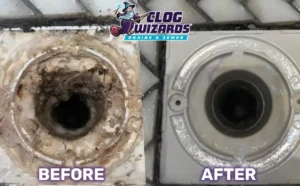
How Professional Drain Cleaning Can Improve Your Home’s Water Quality
If you’ve found yourself elbow-deep in drain dilemmas far too frequently for comfort, the impact on your home may be more than just unsightly. It could be subtly sabotaging something you take for granted every day — your water quality.
Your household plumbing is a crucial pivot in the intricate dance of delivering clean, safe water to every tap in your home. But when the rhythm is disrupted by clogs, the orchestra of H2O harmony starts to sound a bit off-key.
Among the myriad of homeowner headaches, it’s easy to regard a clogged drain as an isolated incident, a simple misfortune that can be fixed with some elbow grease or the aid of a professional plumber.
The Sneaky Culprits Clogging Your Drains
Firstly, familiarity breeds contempt with a clogged drain. It’s a nuisance you grow used to, much like a Monday morning alarm. But unlike that early wake-up call, the causes of clogs aren’t confined to a particular cuisine night or washing laundry on the weekend. Here are some of the most common planetary clog movers quite likely to orchestrate a blockage:
The Greasy Pan Symphony and Hairdo Hiccup
Your morning routine might leave pernicious particles in the shower and moussing muck that gradually brings the tub to a standstill. Meanwhile, the culinary crescendo of every home-cooked meal leaves a greasy imprint, starting with a slim layer and developing into a sticky symphony.
The Hygiene Habits of Households Harming Home Plumbing
Large volumes of toilet tissue or ‘flushable’ wipes become bathroom bouncers, refusing to exit out the main doors and instead clogging the pipelines like uninvited guests at a gala.
The ‘Down-The-Drain’ Disposal Dilemma
The kitchen sink disposal unit can masquerade as a magician, making everything disappear like it’s no one’s business. Until that is, reality rears its traitorous head, and starchy, stringy, or solid refuse units undo the unit.
How These Clogs Tangle With Your Water Quality
Once we identify the usual suspects, it’s imperative to perceive the intertwining relationship with water quality. When constant clogs strangle the flow, they’re also harbingers of harmful elements into your water. Here’s how those violators of water virtuosity do their damage:
Reverse River Flow and Home Havoc
When stagnant water doesn’t drain properly, it becomes a mucky mechanism to bring bacteria back into your vicinity. In simple terms, clogs whittle down the water quality by being the perfect breeding ground for microorganisms that you don’t want to host.
The Cleanliness Con of ‘Cloaked’ Clogs
Even the most meticulously maintained home conceals chaos. Clogs are the clandestine conduit for dirty deeds. The debris accumulating behind the scenes affects not just the purity but also the pressure and taste of your water.
Chemical Clogs and Contamination
Household drain cleaners aren’t heroes; they’re the ‘con’ man who exacerbates the issue. The chemicals can corrode pipes, releasing heavy metals into the water supply. It’s a homegrown horror story of self-inflicted chemical contamination.
Linking Clogged Drains to Household Health Concerns
While the direct impact of clogged drains on your home’s water quality is significant, these blockages can also pose broader health risks that extend beyond tainted tap water. The consequences of ignoring or improperly managing drain clogs can ripple through your household, affecting the overall health environment.
Microbial Growth and Air Quality
Persistent moisture from slow or stagnant water in clogged drains provides a perfect breeding ground for mold and mildew. These fungi not only degrade your home’s structural elements but also release spores into the air, potentially causing respiratory issues and allergic reactions. The connection between damp environments and respiratory problems is well-documented, highlighting the need for vigilant drain maintenance.
Buddy Up with Better Drain Habits
The change starts with you and what you feed to your drains. Educate the household on what not to do — no more flushing fibrous or starchy foods down the disposal, and consider a wire mesh for showers and sinks to trap hair and debris.
DIY Decisive Action Can Do More Damage
A clogged sink or slow-moving shower could be nature’s way of telling you to resist the urge to play handyperson. Seek professional intervention early to avoid over-the-counter quick fixes that can backfire.
Protective Piping for Purely Personal Plumbing
Invest in preventive measures like drain guards or using biodegradable enzymes that break down waste naturally. Think of it as adding a slippery lining to your pipes, which foul substances can’t grip onto.
Increased Exposure to Toxins and Allergens
Clogged drains can also lead to an accumulation of organic matter, which decomposes and may release unpleasant odors and harmful gases. These can include volatile organic compounds (VOCs) that compromise indoor air quality and can have both short-term and long-term health effects. Additionally, backed-up water can bring previously flushed toxins and allergens back into the living space, where they can be ingested or inhaled by household members.
Cross-Contamination Risks
Another critical issue is the risk of cross-contamination that arises when water backs up due to clogged drains. This scenario can mix clean water with contaminated water, spreading bacteria and viruses throughout the water system. In kitchen sinks, for example, this can lead to the contamination of food preparation areas with pathogens like salmonella and E. coli, which are notorious for causing foodborne illnesses.
Stress and Quality of Life
Beyond the physical health implications, dealing with frequent drain clogs can also lead to increased stress and anxiety. Homeowners may find themselves constantly worried about the potential for backups and water damage, which can disturb the peace and comfort of home life. This psychological aspect underscores the importance of addressing drainage issues promptly and effectively.
Preventative Strategies to Safeguard Health
To mitigate these health risks, homeowners should adopt proactive maintenance strategies. This includes regular drain cleaning, avoiding the disposal of inappropriate materials down the drain, and installing drain guards to catch debris. Additionally, being mindful of the signs of clogging and responding quickly when issues arise can prevent the escalation of these health hazards.
Conclusion
Clogged drains do more than just slow down water flow; they can also be a significant detriment to the health of your household. By understanding the potential health impacts of drainage problems and implementing preventative measures, homeowners can maintain not only the purity of their water but also the overall health and well-being of their living environment. Ensuring that your home’s plumbing is in optimal condition is a key step in safeguarding your family’s health and maintaining a healthy home.